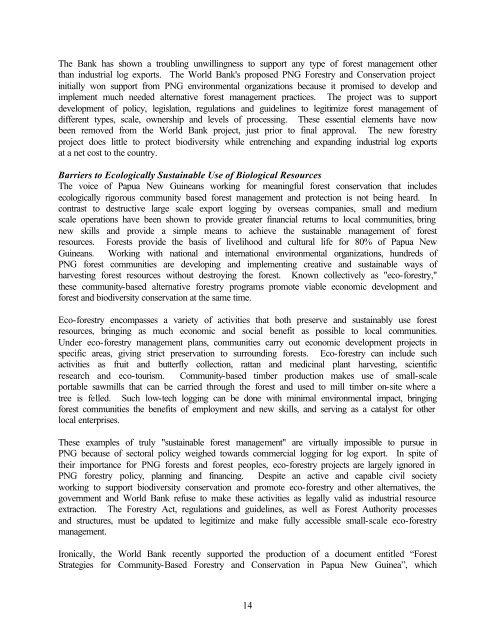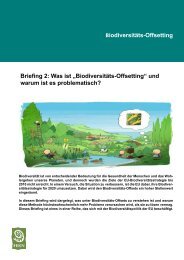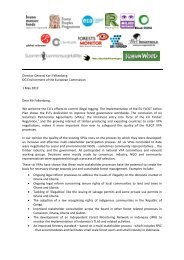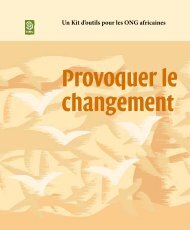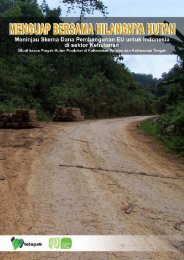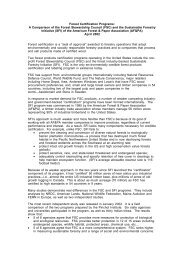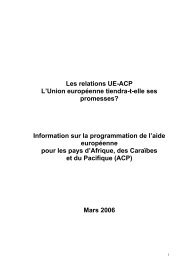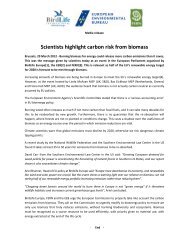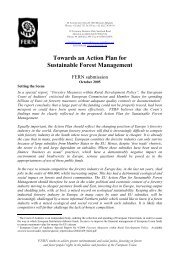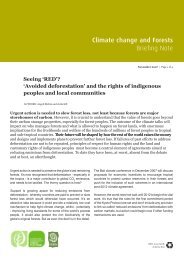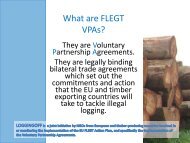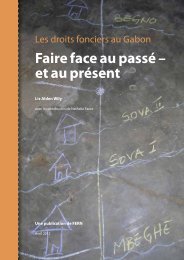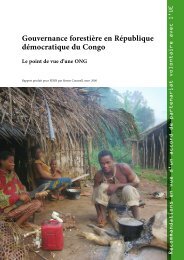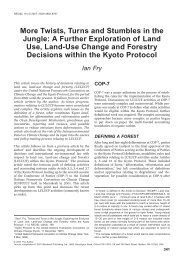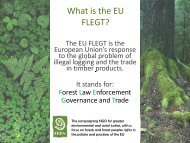Papua New Guinea - Fern
Papua New Guinea - Fern
Papua New Guinea - Fern
Create successful ePaper yourself
Turn your PDF publications into a flip-book with our unique Google optimized e-Paper software.
The Bank has shown a troubling unwillingness to support any type of forest management other<br />
than industrial log exports. The World Bank's proposed PNG Forestry and Conservation project<br />
initially won support from PNG environmental organizations because it promised to develop and<br />
implement much needed alternative forest management practices. The project was to support<br />
development of policy, legislation, regulations and guidelines to legitimize forest management of<br />
different types, scale, ownership and levels of processing. These essential elements have now<br />
been removed from the World Bank project, just prior to final approval. The new forestry<br />
project does little to protect biodiversity while entrenching and expanding industrial log exports<br />
at a net cost to the country.<br />
Barriers to Ecologically Sustainable Use of Biological Resources<br />
The voice of <strong>Papua</strong> <strong>New</strong> <strong>Guinea</strong>ns working for meaningful forest conservation that includes<br />
ecologically rigorous community based forest management and protection is not being heard. In<br />
contrast to destructive large scale export logging by overseas companies, small and medium<br />
scale operations have been shown to provide greater financial returns to local communities, bring<br />
new skills and provide a simple means to achieve the sustainable management of forest<br />
resources. Forests provide the basis of livelihood and cultural life for 80% of <strong>Papua</strong> <strong>New</strong><br />
<strong>Guinea</strong>ns. Working with national and international environmental organizations, hundreds of<br />
PNG forest communities are developing and implementing creative and sustainable ways of<br />
harvesting forest resources without destroying the forest. Known collectively as "eco-forestry,"<br />
these community-based alternative forestry programs promote viable economic development and<br />
forest and biodiversity conservation at the same time.<br />
Eco-forestry encompasses a variety of activities that both preserve and sustainably use forest<br />
resources, bringing as much economic and social benefit as possible to local communities.<br />
Under eco-forestry management plans, communities carry out economic development projects in<br />
specific areas, giving strict preservation to surrounding forests. Eco-forestry can include such<br />
activities as fruit and butterfly collection, rattan and medicinal plant harvesting, scientific<br />
research and eco-tourism. Community-based timber production makes use of small-scale<br />
portable sawmills that can be carried through the forest and used to mill timber on-site where a<br />
tree is felled. Such low-tech logging can be done with minimal environmental impact, bringing<br />
forest communities the benefits of employment and new skills, and serving as a catalyst for other<br />
local enterprises.<br />
These examples of truly "sustainable forest management" are virtually impossible to pursue in<br />
PNG because of sectoral policy weighed towards commercial logging for log export. In spite of<br />
their importance for PNG forests and forest peoples, eco-forestry projects are largely ignored in<br />
PNG forestry policy, planning and financing. Despite an active and capable civil society<br />
working to support biodiversity conservation and promote eco-forestry and other alternatives, the<br />
government and World Bank refuse to make these activities as legally valid as industrial resource<br />
extraction. The Forestry Act, regulations and guidelines, as well as Forest Authority processes<br />
and structures, must be updated to legitimize and make fully accessible small-scale eco-forestry<br />
management.<br />
Ironically, the World Bank recently supported the production of a document entitled “Forest<br />
Strategies for Community-Based Forestry and Conservation in <strong>Papua</strong> <strong>New</strong> <strong>Guinea</strong>”, which<br />
14


